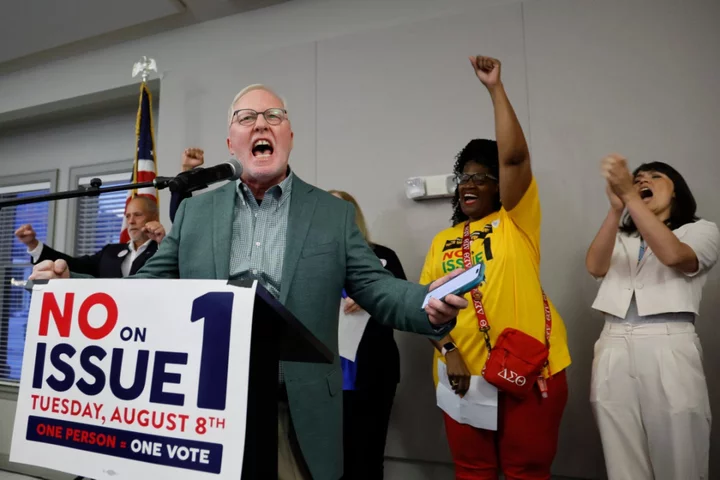
Ohio vote shows enduring power of abortion rights at ballot box, giving Democrats a path in 2024
Abortion wasn't technically on the ballot in Ohio's special election. But the overwhelming defeat of a measure that would have made it tougher to enshrine abortion rights in the state constitution this fall was the latest indicator that the issue remains a powerful force at the ballot box. The election saw heavy turnout for what's typically a sleepy summer election date and sets up another battle in November, when Ohio will be the only state this year to have reproductive rights on the ballot. It also gives hope to Democrats and other abortion rights supporters who say the matter could sway voters their way again in 2024. That's when it could affect races for president, Congress and statewide offices, and when places such as the battleground of Arizona may put abortion questions on their ballots as well. Democrats described the victory in Ohio, a one-time battleground state that has shifted markedly to the right, as a “major warning sign” for the GOP. “Republicans’ deeply unpopular war on women’s rights will cost them district after district, and we will remind voters of their toxic anti-abortion agenda every day until November,” said Aidan Johnson, a spokesperson for the Democratic Congressional Campaign Committee. The measure voters rejected Tuesday, known as Issue 1, would have required ballot questions to pass with 60% of the vote rather than a simple majority. Interest was unusually high, with millions spent on each side and voters casting more than double the number of early in-person and mail ballots ahead of the final day of voting as in a typical primary election. Early turnout was especially heavy in the Democratic-leaning counties surrounding Cleveland, Columbus and Cincinnati. Opposition to the measure, which became a kind of proxy for the November abortion vote, extended even into traditionally Republican areas. In early returns, support for the measure fell far short of Donald Trump’s performance during the 2020 election in nearly every county. The November ballot question will ask voters whether individuals should have the right to make their own reproductive health care decisions, including contraception, abortion, fertility treatment and miscarriage care. Ohio's GOP-led state government in 2019 approved a ban on abortion after cardiac activity is detected — around six weeks, before many women know they are pregnant — but the ban was not enforced because of the U.S. Supreme Court ruling in Roe v. Wade, which granted a federal right to the procedure. When a new conservative majority on the high court last year overturned the nearly 50-year-old ruling, sending authority over the procedure back to the states, Ohio's ban briefly went into effect. But a state court put the ban on hold again while a challenge alleging it violates the state constitution plays out. During the time the ban was in place, an Indiana doctor came forward to say she had performed an abortion on a 10-year-old rape victim from Ohio who could not legally have the procedure in her home state. The account became a national flashpoint in the debate over abortion rights and underscored the stakes in Ohio. Ohio is one of about half of U.S. states where citizens may bypass the Legislature and put ballot questions directly to voters, making it an option that supporters of reproductive rights have increasingly turned to since Roe v. Wade fell. After abortion rights supporters said they hoped to ask voters in November to enshrine the right in the state constitution, Ohio Republicans put Issue 1 on Tuesday’s ballot. In addition to raising the threshold to pass a measure, it would have required signatures to be collected in all 88 counties, rather than 44. The 60% threshold was no accident, abortion rights supporters say, and was aimed directly at defeating the Ohio abortion measure. Since Roe v. Wade was overturned, six states have had elections regarding reproductive rights. In every election — including in conservative states like Kansas — voters have supported abortion rights. In Kansas, 59% voted to preserve abortion rights protections, while in Michigan 57% favored an amendment that put protections in the state constitution. Last year, 59% of Ohio voters said abortion should generally be legal, according to AP VoteCast, a broad survey of the electorate. Last month, a poll by the Associated Press-NORC Center for Public Affairs Research found the majority of U.S. adults want abortion to be legal at least through the initial stages of pregnancy. The poll found that opinions on abortion remain complex, with most people believing abortion should be allowed in some circumstances and not in others. Opponents of the Ohio abortion question ran ads that suggested the measure could strip parents of their ability to make decisions about their child’s health care or to even be notified about it. Amy Natoce, spokesperson for the anti-abortion campaign Protect Women Ohio, called the ballot measure a “dangerous anti-parent amendment.” Several legal experts have said there is no language in the amendment supporting the ads’ claims. Peter Range, CEO of Ohio Right to Life, said he has been traveling across Ohio talking to people and “I’ve never seen the grassroots from the pro-life side more fired up to go and defend and protect the pre-born.” While the November question pertains strictly to Ohio, access to abortion there is pivotal to access across the Midwest, said Alison Dreith, director of strategic partnership for the abortion fund Midwest Access Coalition. Nine Midwestern states — Indiana, Iowa, Kansas, Ohio, Nebraska, Missouri, North Dakota, South Dakota and Wisconsin — are considered restrictive, very restrictive or most restrictive of abortion rights by the Guttmacher Institute, a research and policy organization that supports legal access to abortion. “Ohio in particular has always been a destination state for the states around it,” Dreith said. “If we don’t protect abortion access in Ohio, the options just continue to shrink for people seeking care in the Midwest.” Sri Thakkilapati, the executive director of the Cleveland-based nonprofit abortion clinic Preterm, said the effect of the Ohio vote will reverberate throughout the country. “When we restrict access in one state, other states have to take up that patient load,” she said. “That leads to longer wait times, more travel, higher costs for patients." Thakkilapati called the energy around abortion rights in last year's midterms “exciting.” But she said the media attention died down, and people quickly forgot “how tenuous abortion access is right now.” The special election and ballot measure in Ohio are “a reminder of what’s at stake," Thakkilapati said. “Other states are watching how this plays out in Ohio, and it may give anti-abortion groups in other states another strategy to threaten abortion rights elsewhere,” she said. “And for the majority who do want abortion access in their states but are seeing it threatened, the results in November could give them hope that the democratic process may give them relief.” Kimberly Inez McGuire, the executive director of Unite for Reproductive and Gender Equity, which focuses on young people of color under age 30, says the results of elections involving reproductive rights show that support doesn't come just from Democrats or in cities and states considered liberal bastions. “There was this idea that we couldn’t win on abortion in red states and that idea has really been smashed,” McGuire said. So, too, she said, is the “mythology” that people in the South and Midwest won't support abortion rights. “I think 2024 is going to be huge,” she said. “And I think in many ways, Ohio is a proving ground, an early fight in the lead up to 2024.” Dreith said that since abortion hasn't been on a major ballot since last year, the Ohio vote this fall is “a good reminder” for the rest of the country. “Abortion is always on the ballot — if not literally but figuratively through the politicians we elect to serve us,” she said. "It’s also a reminder that this issue isn’t going away.” Read More Ukraine war’s heaviest fight rages in east - follow live Charity boss speaks out over ‘traumatic’ encounter with royal aide Why Ohio's Issue 1 proposal failed, and how the AP called the race Ohio voters reject GOP plan to thwart upcoming abortion rights proposal Abortion rights advocates push for 2024 ballot initiative in Arizona
2023-08-09 23:50
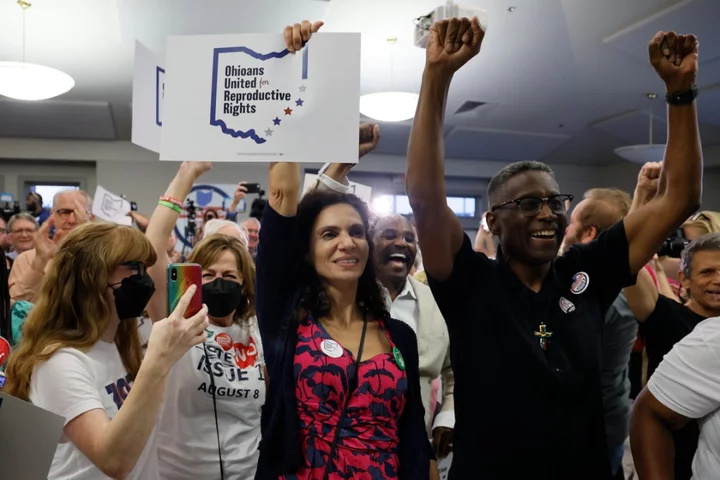
Abortion rights advocates win major victory in Ohio as voters reject GOP plan to thwart ballot measure
Ohio voters have resoundingly rejected a measure that would make it more difficult to amend the state’s constitution, a proposal that Republican officials bluntly admitted was an effort to kneecap an upcoming ballot measure asking voters to enshrine a right to abortion care. That proposal has failed, with roughly 65 per cent of the vote tallied by Tuesday night after polls had closed, according to projections from the Associated Press. Issue 1 would have required that proposed amendments to the state constitution receive at least 60 per cent of the vote, raising the threshold substantially from a current simple majority vote. It also would have increased the minimum number of petition signatures that groups would have to collect before qualifying an issue to get on a ballot. The proposal’s failure means that a November referendum on abortion rights will need only 50 per cent of the vote to enshrine those protections into the state’s constitution, a major victory for abortion rights advocates and democratic campaigns in the aftermath of the US Supreme Court’s decision to strike down Roe v Wade. President Joe Biden called the measure a “blatant attempt to weaken voters’ voices and further erode the freedom of women to make their own health care decisions.” “Ohioans spoke loud and clear, and tonight democracy won,” he said in a statement. Within the last year, voters have also turned out in record numbers to protect abortion rights in California, Kansas, Michigan and Vermont, underscoring the overwhelming unpopularity of the Supreme Court’s decision and the volatile landscape for reproductive healthcare in its wake, while scrambling anti-abortion campaigns from Republican officials emboldened by the ruling. Issue 1 campaign Protect Our Constitution was largely supported by GOP mega-donor and Illinois businessman Richard Uihlein. A coalition of abortion right, civil rights and democratic advocacy groups joined a No On Issue 1 campaign. “Tonight was a major victory for democracy in Ohio,” the group said in a statement following projections of the measure’s defeat. “The majority still rules in Ohio, and the people’s power has been preserved – because Ohio voters showed up and overwhelmingly voted down Issue 1.” Ohio voters saw the proposal for “what it was: a deceptive power grab designed to silence their voices and diminish their voting power,” the group added. Kelly Hall, executive director of the Fairness Project, said the results mark an “incredibly profound and inspiring day for democracy”. “When faced with the choice of whether to allow politicians and special interests to consolidate power and strip voters of their rights, Ohioans fought back,” she said in a statement. “The defeat of Issue 1 should send a clear message to other extremist officials around the country that democracy will not die; people are ready to defend their rights against blatant attacks like Issue 1.” The upcoming proposal for a constitutional amendment in November will ask Ohio voters whether “every individual has a right to make and carry out one’s reproductive decisions.” After the Supreme Court’s ruling in Dobbs v Jackson Women’s Health Organization last June, Ohio lawmakers swiftly outlawed most abortion after roughly six weeks of pregnancy, a law that is currently suspended by a state court injunction but could be reinstated by the state Supreme Court. A vote to enshrine abortion rights in the state’s constitution would effectively overrule any such law. Abortion rights advocates and providers have warned that Ohio’s ban, which does not include exceptions for pregnancies from rape or incest, ignited a healthcare crisis that endangered patients and their families across the state, forcing people to seek care hundreds of miles out of state and navigate complicated legal and medical minefields while experiencing pregnancy complications. Ohio Republicans initially canceled August elections altogether, which have historically low turnout. But in May, they reversed that decision to put Issue 1 on the ballot – a decision that appears to have backfired for them. Nearly 600,000 Ohio voters cast their ballots early, with voters reporting busy polling locations across the state on election day. Read More Texas judge sides with women after harrowing testimony over anti-abortion law DeSantis won’t rule out national abortion ban but suggests there’s no ‘mileage’ left in Congress
2023-08-09 11:28

DeSantis won’t rule out national abortion ban but suggests there’s no ‘mileage’ left in Congress
Ron DeSantis has not ruled out enacting a national abortion “ban” if elected president, after the Florida governor implemented state restrictions on abortion access at 15 weeks and six weeks of pregnancy within the last two years. But he suggested that there is no “consensus” in the US for members of Congress to implement a national ban, as abortion restrictions and the US Supreme Court’s decision to overturn Roe v Wade remain overwhelmingly unpopular. Asked by NBC’s Dasha Burns whether he would “veto any sort of federal bill” that would institute a nationwide ban, Mr DeSantis replied: “We will be a pro-life president and we will support pro-life policies.” In the wake of the Supreme Court’s decision to revoke a constitutional right to abortion care last year, Republican officials have repeatedly stated that the ruling merely left it up to individual states to decide. But anti-abortion lawmakers at the state level and in Congress continue to push for national restrictions that would also strike down state laws that protect and expand abortion access. Congressional Republicans have already passed several anti-abortion measures with national implications and have signalled the GOP’s readiness to ban abortion at certain gestational limits. President Joe Biden has promised to veto any such legislation, if it made it through Congress. In media appearances throughout his campaign, the governor has not directly answered whether he would support or veto legislation that would enact national abortion restrictions, suggesting that the issue should come from the “bottom up” with individual states determining policy. His statements have drawn criticism from influential anti-abortion group Susan B Anthony Pro-Life America, which called the governor’s position “unacceptable” to anti-abortion voters. Meanwhile, his campaign’s top donor has threatened to stop funding the candidate over his “extreme” position on abortion. And Donald Trump, who has taken credit for the Supreme Court’s decision in Dobbs v Jackson Women’s Health Organization, has suggested that his rival for the 2024 Republican nomination for president has gone too far with a state law that bans abortion at six weeks of pregnancy, signed into law just one year after a 15-week limit was put in place. “Dobbs returned it to the political branches. I think the reality is that that basically means the states are going to have primary control over it,” Mr DeSantis told NBC. “You know, I do think the federal government would have an interest in, say, preventing post-birth abortions or things that are really horrific, but I don’t think that there’s enough consensus in the country to see a lot of mileage in Congress,” he added. There is no such thing as a “post-birth” abortion; killing an infant after birth is illegal in all states, and pregnancies resulting in the death of the fetus in the third trimester are exceedingly rare, and largely involve fetal anomalies and life-threatening medical emergencies. The vast majority of abortions take place within the first trimester, while roughly 1 per cent occur after 21 weeks, according to the US Centers for Disease Control and Prevention. The governor also suggested that Democratic officials support “infanticide”, echoing his remarks in a recent CNN interview claiming that “liberal state” allow “post-birth” abortion. “I would not allow what a lot of the left wants to do, which is to override pro-life protections throughout the country all the way up really to the moment of birth in some instances, which I think is infanticide,” he told NBC News. Ms Burns interrupted Mr DeSantis: “That’s a misrepresentation of what’s happening.” The governor also said that he does not support penalties for people who seek abortions. “Not at all,” he told Ms Burns. “No, I don’t think this is an issue about the woman. I think a lot of these women, you know, are in very difficult circumstances. They don’t get any support from a lot of the fathers. And a lot of them, the number one reason why women choose to have an abortion is because they’re not getting support and they feel abandoned. Now, in Florida we’ve provided support and we’ve put our money where our mouth is, but at the end of the day, you know, I would not support any penalties on a woman.” Mr DeSantis also told NBC that he does not support limits on contraception access. “And I think it should be available over-the-counter, and I think people should be able to have access to it,” he added. Read More Texas judge sides with women after harrowing testimony over anti-abortion law Alabama health care providers sue over threat of prosecution for abortion help ‘Walmart Melania’, ‘America’s Karen’ or ‘Tacky Onassis’: Why Casey DeSantis matters to the 2024 race Senator who once worked at a Planned Parenthood warns that Republicans are planning a national abortion ban
2023-08-08 00:47
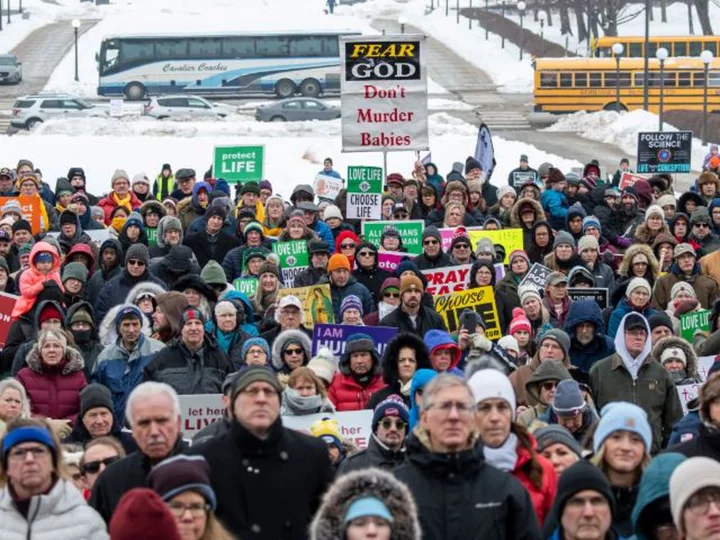
The anti-abortion movement is fractured over what it wants from its first post-Roe GOP presidential nominee
Bernie Hayes has spent most Mondays since the overturning of Roe v. Wade meeting with friends outside of an Iowa Planned Parenthood trying to stop abortions one at a time. He huddles monthly with other like-minded activists plotting more wholesale paths to halting the procedure.
2023-08-07 04:28

Trump goes on kooky rant about how long it takes to wash his ‘gorgeous head of hair’
With a trio of indictments looming overhead, Donald Trump took time to assure his voters that he was focused on what really matters heading into 2024 — his shower's water pressure. During the keynote speech of a GOP dinner in South Carolina on Saturday, Mr Trump told the crowd that modern water pressures just weren't getting the job done. Though Mr Trump has proven in past speeches that he does not need segues — preferring instead to crash from topic to topic without regard for logic or causality — he did lead into his shower rant, sort of, by complaining about regulations. “You know I have this gorgeous head of hair – when I take a shower, I want water to pour down on me. When you go into these new homes with showers, the water drips down slowly, slowly,” Mr Trump told the diners. It is unclear where Mr Trump — whose two main domiciles are a luxury golf resort in Florida and a gilded skyscraper in Manhattan, both of which he owns — is experiencing these shower troubles. “You have suds, beautiful nice wonderful suds, a lot of money, Procter & Gamble, all that crap that they sell they say is good, probably costs ’em about two cents and they sell it for $10," Mr Trump said. "It takes you 10 minutes to wash your hair. You know what you do? You just stay in the shower about 10 times longer than you would have, it’s the same, you probably use more water. I broke all that up.” It's not the first time Mr Trump has complained about his bathroom activities being disrupted by water conservation efforts. In 2019 he made the telling-on-himself admission that Americans had to flush their toilets "10 times, 15 times, as opposed to once," blaming water regulating standards for his apparent need to flush a dozen times per use. “You turn on the faucet and you don’t get any water. They take a shower and water comes dripping out. Just dripping out, very quietly dripping out,” he said at the time. “People are flushing toilets 10 times, 15 times, as opposed to once.” The water issue was one of the few things Mr Trump did while in office that aligned with his early campaign promises; he directed the Department of Energy to ease up water conservation standards for showerheads. The former president may have changed the rules, but it didn't really change the way products were manufactured. Nearly all commercially available showerheads during his presidency adhered to the previous standards. Joe Biden reversed the measure following Mr Trump's presidency. Perhaps the most baffling element of Mr Trump's water gripes is his insistence that easing up regulations would actually save water. “[Americans] end up using more water. So [the] EPA is looking at that very strongly at my suggestion,” Mr Trump said in 2019. And later in 2019: “You go into a new building or a new house or a new home and they have standards only you don’t get water. You can’t wash your hands practically, there’s so little water comes out of the faucet. And the end result is you leave the faucet on and it takes you much longer to wash your hands,” Mr Trump said. He then told his supporters that his administration would be "looking at" the concept of "rain" and "opening that up." It is unclear what he was talking about, but here is what he said. “There may be some areas where we’ll go the other route – desert areas – but for the most part you have many states where they have so much water – it comes down, it’s called rain. They don’t know what to do with it,” he said, laughing at what presumably was a joke. “So we’re going to be looking at opening up that I believe. And we’re looking at changing the standards very soon.” Read More Trump attacks ‘delusional’ Pence over key role in election indictment: ‘Gone to the dark side’ Trump demands Judge Tanya Chutkan be removed from election case after ruling against him DoJ requests protective order after Trump threatens revenge in Truth Social post Trump attacks ‘delusional’ Pence over key role in election indictment Trump demands Judge Tanya Chutkan be removed from election case Vivek Ramaswamy's Hindu faith is front and center in his GOP presidential campaign
2023-08-07 00:58

Kentucky voters weigh in on McConnell's health scare
Senate Minority Leader Mitch McConnell spoke Saturday at the Fancy Farm picnic, one of Kentucky's classic political events, but his remarks were largely drowned out by jeers from the Democratic side of the crowd, who stomped their feet and yelled, "RETIRE," and "DITCH MITCH" as he spoke.
2023-08-06 05:15
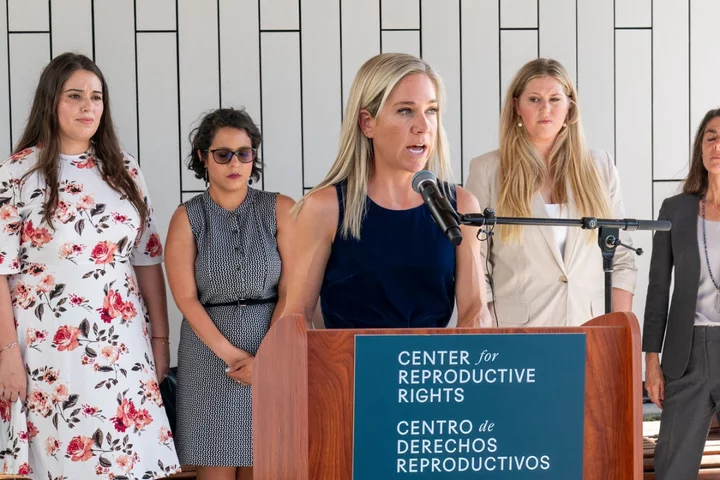
Texas judge sides with women after harrowing testimony over anti-abortion law
A Texas judge has sided with a group of women who were denied abortions in the state, putting their health and lives at risk during dangerous complications. The judge has temporarily blocked the state’s ban on abortions during medically complicated pregnancies in response to a lawsuit from 13 women seeking urgent clarity in the state’s anti-abortion law. An injunction from District judge Jessica Mangrum on 4 August follows harrowing courtroom testimony from five plaintiffs during a two-day hearing in which they were cross examined by attorneys for the state, which has sought to toss the case out altogether. The judge has also rejected that request. “For the first time in a long time, I cried for joy when I heard the news,” lead plaintiff Amanda Zurawski said in a statement from the Center for Reproductive Rights, which is representing the women in the case. “This is exactly why we did this. This is why we put ourselves through the pain and the trauma over and over again to share our experiences and the harms caused by these awful laws,” she added. “I have a sense of relief, a sense of hope, and a weight has been lifted. Now people don’t have to be pregnant and scared in Texas anymore. We’re back to relying on doctors and not politicians to help us make the best medical decisions for our bodies and our lives.” Texas outlaws most abortions except for conditions that qualify as “medical emergencies,” sparking widespread confusion among providers and hospitals fearing legal blowback or severe criminal penalties. Healthcare providers in the state found in violation of those laws could lose their medical license, face tens of thousands of dollars in fines, or prison. The lawsuit asked the court to help provide clarity around what circumstances qualify as exceptions, allowing doctors to use their own medical judgment without fear of prosecution. In her ruling, Judge Jessica Mangrum wrote that doctors cannot be prosecuted for using their own “good faith judgment” in providing such care, and that “physical medical conditions include, at a minimum: a physical medical condition or complication of pregnancy that poses a risk of infection, or otherwise makes continuing a pregnancy unsafe for the pregnant person; a physical medical condition that is exacerbated by pregnancy, cannot be effectively treated during pregnancy, or requires recurrent invasive intervention; and/or a fetal condition where the fetus is unlikely to survive the pregnancy and sustain life after birth.” The injunction will be temporarily blocked if and when the state appeals the decision. “This makes me hopeful that we can continue to provide competent rational care,” said Dr Damla Karsan, who is among two obstetrician-gynecologists who joined 13 other Texas women in the case. “It’s exactly what we needed,” she added. “The court has guaranteed that we can once again provide the best care without fear of criminal or professional retribution. We can once again rely on our knowledge and training especially in challenging situations where abortions are necessary.” More than a dozen states, largely across the US South, have effectively outlawed abortions in the aftermath of the US Supreme Court decision to revoke a constitutional right to abortion care. The decision to overturn Roe v Wade and ensuing anti-abortion laws have upended access to care for millions of Americans who are forced to travel outside their states where abortion is protected, compounding the already-fractured and patchwork system for abortion care across the country. Anti-abortion laws in Texas have “paralyzed” health providers from being able to properly counsel and advise their patients, Dr Austin Dennard testified during the Texas abortion lawsuit hearing. “We’re truly doing the best that we can with the situation that has been given to us,” she said. Read More Texas women detailed agonising pregnancies after being denied abortions. The state blames doctors Texas women suing over anti-abortion law give heartbreaking testimony in landmark case. The stress causes one to vomit on the stand Texas man who threatened poll workers and Arizona officials is sentenced to 3 1/2 years Colorado fugitive who was captured in Florida was leading a posh lifestyle and flaunting his wealth A cyberattack has disrupted hospitals and health care in several states
2023-08-05 12:15

Ron DeSantis mocked for dismal turnout at campaign event offering $1 beer
Ron DeSantis drew only a few dozen people to a $1 beer campaign event in New Hampshire, according to local reports. The event, held Saturday in Concord, initially drew approximately two dozen people, according to NBC News. The original price for the event — which allows voters to drink a beer with Mr DeSantis — was set at $50, but was later slashed to $1 in order to bolster turnout. The event reportedly started a half-hour late, and only 30 people were in attendance. Discussing the event on MSNBC, reporter Jonathan Allen quipped that "maybe [Mr DeSantis's campaign] should have offered something harder ... maybe half a bottle of liquor or something." He also noted that Mr DeSantis later attended a house party, which only drew about 35 attendees. Allen said that the governor's last few campaign trips have failed to draw many supporters and has resulted in numerous viral clips of the candidate looking awkward while engaging with voters. "So, he spent four days in New Hampshire, he had a couple of good events with slightly larger crowds, but maybe he met 2- or 300 people over the course of four days, which is wasted campaign time at this point in a presidential primary," Allen said. "It also says this comes on the back end of a two-day bus tour of Iowa, where we saw images and recordings of DeSantis struggling to talk with voters, to connect with them, asking a child at one point about the sugar content of his Icee." In the "Icee" incident, Mr DeSantis notes that a child is holding a frozen drink from a local store, and seems to suggest its not a healthy choice. "Oh what is that? An Icee?" he asks. "That's probably a lot of sugar, huh?" Later the same night, an 82-year-old farmer told the governor that he can't work the same acreage he used to since his wife died from cancer, and asked about his thoughts on ethanol as a renewable fuel for cars. Instead of taking the chance to offer the farmer sympathy for his struggles, Mr DeSantis launched into prepared comments about stemming "this rush to electric vehicles." Despite these incidents, Mr DeSantis's team has insisted that he is not struggling to connect with voters, painting the critical coverage as organised media hit jobs trying to undermine the governor. "The media will continue their obsession with endless clickbait stories that do nothing to inform voters, and Ron DeSantis will keep sharing his plans to declare American's economic independence and restore sanity in our country as the next president," Andrew Romeo, Mr DeSantis's campaign spokesman, said. Mr Romeo said that though "some candidates think they are entitled to the nomination, the governor will not be outworked and will fight for every vote, one day at a time." Read More DeSantis wants Kamala Harris to meet the controversial right-wing scholar behind Florida’s slavery curriculum DeSantis-controlled Disney World district abolishes diversity, equity initiatives DeSantis ducks opportunity to attack Trump’s massive campaign spending on legal fees Ron DeSantis mocked for dismal turnout at campaign event offering $1 beer Matt Gaetz calls DeSantis ‘thirsty’ for Kamala Harris invite DeSantis calls new Trump indictment ‘unfair’ - while pushing his own campaign
2023-08-02 18:19

House Republicans aren't done slashing food assistance and fighting over social issues
After clamping down on food stamps in the debt ceiling deal, House Republicans now want to take a whack at WIC, the food assistance program for low-income women, infants and young children.
2023-07-31 19:15

Concerns mount over potential for food crisis amid Russian moves to cripple Ukrainian grain exports
The US and its allies are grappling with how to avert a global food crisis following Moscow's withdrawal from the Black Sea grain deal and its subsequent attacks on Ukraine's ports and storage facilities.
2023-07-27 07:45
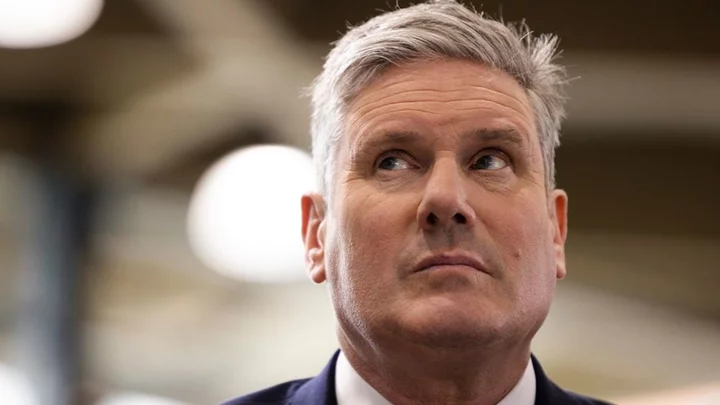
Keir Starmer has revealed what his final meal would be
Keir Starmer has revealed what his last ever meal would be. In an appearance on the Table Manners podcast, hosted by Jessie and Lennie Ware, the Labour leader described what he would eat for dinner if he was to be cast out to a desert island for six months. We're not sure what it says about whether or not he is suited to be prime minister, but here's the munch. He would have a seaweed salad for starter, tandoori salmon from a restaurant in Glasgow he likes with dahl, plain naan and pilau rice, and he would finish things off with a baked lemon cheesecake. He would also have pinot grigio as his drink of choice because his wife likes it. How chivalrous. Elsewhere on the food-themed podcast, Starmer said he used to eat jam sandwiches after school and gave up meat 25 years ago "out of principle" despite loving it. His 15-year-old son brings meat into the house which tempts him but his daughter and wife are fully vegetarian. Sign up to our free Indy100 weekly newsletter He said the food in the House of Commons is "nothing special" and he never really gets a lunch break. "I've had lorry loads of tuna sandwiches since I've been in this job," he said. He eats them on the road travelling or while he is working and usually gets them from Pret a Manger, which will no doubt lead to accusations he is a champagne socialist from those a bit too far on the left. He hates bananas and can't even smell them and isn't a fan of avocados either. Despite the lemon cheesecake, he doesn't really have a sweet tooth and only eats dessert "rarely". Starmer also spoke about how important family life is to him. He spends every Friday night with his family so he can see his children. He also said he "loves cooking" and uses it to unwind on a Saturday. He likes making tandoori quorn and "elaborate" pasta bakes but his teenage children can be fussy. As for politics, because that is probably just about more important for him to speak about than food (but only just), he joined the Labour Party at 16 because of a "burning sense" that there needed to be change which came from growing up with little money. "It just made absolute sense to me," he said. He said polarization in politics was "corrosive" and spoke out against tribal politicians who do not mix with the opposition. He wants the next general election to come as soon as possible because "people are really suffering now" with bills and mortgages thanks to the current Tory government and said he was driven by the desire to help the country, rather than get the Labour party into power. "For the country's sake we need it [the general election] soon," he said. We'll back him on that, even if he has weird opinions about avocados. Have your say in our news democracy. Click the upvote icon at the top of the page to help raise this article through the indy100 rankings.
2023-07-26 20:20

Abortion rights amendment qualifies for November ballot in Ohio
Ohio Secretary of State Frank LaRose announced Tuesday that organizers submitted enough valid signatures to put an amendment on the November ballot to enshrine abortion rights in the state's constitution.
2023-07-26 05:49
